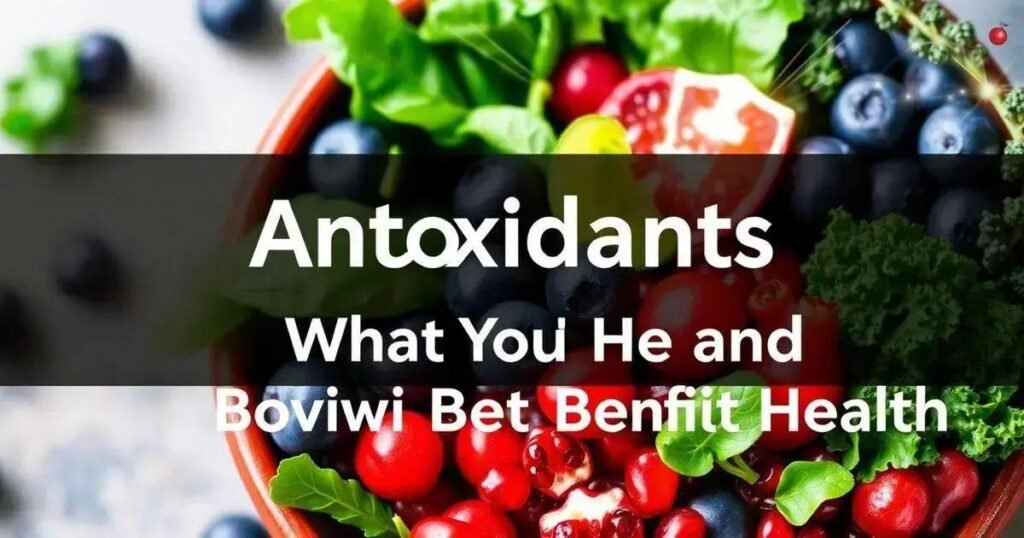Did you know that Antioxidants are natural superheroes that can help protect your body from damage caused by free radicals?
These tiny molecules are found in a wide range of foods and can have a significant impact on your overall health and wellbeing.
But what exactly are Antioxidants, and how can you incorporate them into your daily routine?
In this comprehensive guide, we’ll explore the benefits of Antioxidants, from fighting free radicals to improving cardiovascular health, and provide you with the tools you need to harness their power for a healthier you.
Table of Contents
Introduction to Antioxidants and Their Importance
Antioxidants are substances that help protect cells from damage caused by free radicals, which are unstable molecules that can harm cells and contribute to aging and diseases. The importance of Antioxidants lies in their ability to neutralize these free radicals, preventing them from causing harm to the body. This can lead to a range of benefits, from improved cardiovascular health to enhanced cognitive function. By understanding the role of Antioxidants in maintaining overall health, individuals can take steps to incorporate more of these powerful compounds into their diets and lifestyles.
Free radicals are highly reactive molecules that can damage cells and contribute to aging and diseases. When cells produce energy, they can release electrons that become unpaired and form free radicals. These molecules can then react with other molecules, causing damage to cells and tissues. Antioxidants work by neutralizing these free radicals, preventing them from causing harm to the body. This can be achieved through diet, supplements, or lifestyle changes, such as reducing exposure to environmental toxins or smoking.
Antioxidants can have a significant impact on everyday life, from improving overall health to enhancing cognitive function. By incorporating Antioxidant-rich foods into their diets, individuals can protect their bodies from damage caused by free radicals. Antioxidants can also help to reduce the risk of chronic diseases, such as heart disease and cancer, by neutralizing free radicals and preventing them from causing harm. In addition, Antioxidants can help to improve mental clarity and memory, making them an important part of a healthy lifestyle.
Foods that are rich in Antioxidants can be found in a variety of categories, including fruits, vegetables, nuts, and whole grains. Berries, in particular, are known for their high Antioxidant content, with blueberries and raspberries being among the top sources. Other Antioxidant-rich foods include leafy greens, such as spinach and kale, as well as olive oil and fatty fish. By incorporating these foods into your diet, you can increase your Antioxidant intake and reap the many benefits that come with it.
Many fruits and vegetables are rich in Antioxidants, with some being more potent than others. The top 10 Antioxidant-rich fruits and vegetables include blueberries, raspberries, strawberries, spinach, kale, blackberries, green tea, pomegranates, and cranberries. These foods can be easily incorporated into your diet, whether through smoothies, salads, or as a side dish. By consuming these Antioxidant-rich foods, you can help to protect your body from damage caused by free radicals and improve your overall health.
Harnessing the power of Antioxidants requires a comprehensive approach that incorporates diet, lifestyle changes, and supplements. By understanding the role of Antioxidants in maintaining overall health, individuals can take steps to incorporate more of these powerful compounds into their diets and lifestyles. By doing so, they can help to protect their bodies from damage caused by free radicals and improve their overall health and wellbeing.
The Science Behind Antioxidants and Free Radical Damage

Free radicals are unstable molecules that can cause oxidative stress and damage to cells, proteins, and DNA. This damage can lead to chronic diseases such as cancer, heart disease, and Alzheimer’s disease. Antioxidants, on the other hand, are molecules that neutralize free radicals, preventing them from causing harm. This is achieved through a series of reactions that involve the donation of electrons to stabilize the free radicals. In this way, antioxidants play a crucial role in maintaining cellular health and preventing disease.
Antioxidants work by neutralizing free radicals, which are highly reactive molecules that can damage cells and tissues. This can occur through a variety of mechanisms, including the donation of electrons to stabilize the free radicals, the binding of free radicals to antioxidants, and the destruction of free radicals by antioxidants. Antioxidants can be found in a wide range of foods, including fruits, vegetables, nuts, and whole grains, and can also be obtained through supplements.
Antioxidants can have a significant impact on everyday life, from improving overall health to enhancing cognitive function. By incorporating antioxidant-rich foods into their diets, individuals can protect their bodies from damage caused by free radicals. Antioxidants can also help to reduce the risk of chronic diseases, such as heart disease and cancer, by neutralizing free radicals and preventing them from causing harm. In addition, antioxidants can help to improve mental clarity and memory, making them an important part of a healthy lifestyle.
Foods that are rich in antioxidants can be found in a variety of categories, including fruits, vegetables, nuts, and whole grains. Berries, in particular, are known for their high antioxidant content, with blueberries and raspberries being among the top sources. Other antioxidant-rich foods include leafy greens, such as spinach and kale, as well as olive oil and fatty fish. By incorporating these foods into your diet, you can increase your antioxidant intake and reap the many benefits that come with it.
Many fruits and vegetables are rich in antioxidants, with some being more potent than others. The top 10 antioxidant-rich fruits and vegetables include blueberries, raspberries, strawberries, spinach, kale, blackberries, green tea, pomegranates, and cranberries. These foods can be easily incorporated into your diet, whether through smoothies, salads, or as a side dish. By consuming these antioxidant-rich foods, you can help to protect your body from damage caused by free radicals and improve your overall health.
Harnessing the power of antioxidants requires a comprehensive approach that incorporates diet, lifestyle changes, and supplements. By understanding the role of antioxidants in maintaining overall health, individuals can take steps to incorporate more of these powerful compounds into their diets and lifestyles. By doing so, they can help to protect their bodies from damage caused by free radicals and improve their overall health and wellbeing.
Benefits of Antioxidants in Everyday Life
Antioxidants play a crucial role in everyday life, offering a range of benefits that can improve overall health and wellbeing.
By incorporating antioxidant-rich foods into their diets, individuals can boost their immune systems, reduce the risk of chronic diseases, and even improve their mental clarity and memory.
Antioxidants can also help to protect the body from damage caused by free radicals, which are unstable molecules that can cause oxidative stress and cellular damage.
This can lead to a range of negative effects, including premature aging, wrinkles, and age-related diseases.
By consuming antioxidant-rich foods, individuals can help to neutralize free radicals and protect their bodies from damage.
Food Sources of Antioxidants: A Guide

Antioxidants can be found in a variety of foods, including fruits, vegetables, nuts, and whole grains.
Berries, in particular, are known for their high antioxidant content, with blueberries and raspberries being among the top sources.
Other antioxidant-rich foods include leafy greens, such as spinach and kale, as well as olive oil and fatty fish.
Dark chocolate, green tea, and pomegranates are also excellent sources of antioxidants.
In addition to incorporating these foods into your diet, you can also consider taking antioxidant supplements to boost your intake.
By consuming a balanced diet rich in antioxidants, you can help to protect your body from damage caused by free radicals and improve your overall health and wellbeing.
Antioxidant-Rich Fruits and Vegetables: Top 10
When it comes to incorporating Antioxidants into your diet, fruits and vegetables are a great place to start. Here are the top 10 Antioxidant-rich fruits and vegetables to add to your grocery list:
- Blueberries: These small, round fruits are packed with Antioxidants and have been shown to improve memory and cognitive function.
- Raspberries: Raspberries are another Antioxidant-rich fruit that can help protect against chronic diseases like heart disease and cancer.
- Strawberries: Fresh strawberries are a great source of Vitamin C and Antioxidants, making them a healthy snack option.
- Spinach: This leafy green is a powerhouse of Antioxidants and has been shown to reduce the risk of chronic diseases like heart disease and cancer.
- Kale: Kale is another Antioxidant-rich leafy green that can help protect against chronic diseases.
- Green Tea: Green tea is a great source of Antioxidants and has been shown to improve heart health and reduce the risk of chronic diseases.
- Pomegranates: Pomegranates are a rich source of Antioxidants and have been shown to improve heart health and reduce the risk of chronic diseases.
- Cranberries: Cranberries are a great source of Antioxidants and have been shown to improve heart health and reduce the risk of chronic diseases.
- Blackberries: Blackberries are another Antioxidant-rich fruit that can help protect against chronic diseases.
- Red Bell Peppers: Red bell peppers are a great source of Antioxidants and have been shown to improve heart health and reduce the risk of chronic diseases.
Conclusion: Harnessing the Power of Antioxidants for a Healthier You

In conclusion, Antioxidants play a crucial role in maintaining overall health and wellbeing. By incorporating Antioxidant-rich foods into your diet and understanding the science behind Antioxidants and free radical damage, you can harness the power of Antioxidants to improve your health.
Whether you’re looking to boost your immune system, reduce the risk of chronic diseases, or simply feel more energetic and focused, Antioxidants can help.
Remember to choose a variety of Antioxidant-rich foods, including fruits, vegetables, nuts, and whole grains, and consider taking Antioxidant supplements if necessary.
With the right combination of diet and lifestyle changes, you can harness the power of Antioxidants to achieve a healthier and happier you.
Frequently Asked Questions about Antioxidants
What are antioxidants and why are they important?
Antioxidants are substances that help protect cells from damage caused by free radicals. They are important because they can help prevent chronic diseases, improve overall health, and reduce the risk of certain cancers.
Can antioxidants be found in food?
Yes, antioxidants can be found in a variety of foods, including fruits, vegetables, nuts, and whole grains. Some examples of antioxidant-rich foods include blueberries, spinach, and pomegranates.
How can I increase my antioxidant intake?
You can increase your antioxidant intake by consuming a balanced diet that includes a variety of antioxidant-rich foods. Additionally, you can consider taking antioxidant supplements or using antioxidant-containing skincare products.
What are the benefits of antioxidants for overall health?
Antioxidants have been shown to have numerous benefits for overall health, including reducing the risk of chronic diseases, improving heart health, and reducing the risk of certain cancers.
Can antioxidants help improve cognitive function?
Yes, antioxidants have been shown to help improve cognitive function and reduce the risk of age-related cognitive decline.
Are there any potential side effects of taking antioxidant supplements?
While antioxidant supplements are generally considered safe, there are some potential side effects to be aware of, including interactions with certain medications and allergic reactions.
Can antioxidants help improve skin health?
Yes, antioxidants have been shown to help improve skin health by reducing oxidative stress and inflammation, which can contribute to signs of aging such as wrinkles and fine lines.



